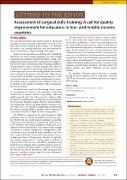| dc.contributor.author | Okello, Tom Richard | |
| dc.contributor.author | Mugabi, Patrick | |
| dc.contributor.author | Ghee, Hwang | |
| dc.contributor.author | Michelle, Sutter | |
| dc.contributor.author | Lett, Ronald | |
| dc.date.accessioned | 2021-05-12T10:56:45Z | |
| dc.date.available | 2021-05-12T10:56:45Z | |
| dc.date.issued | 2019 | |
| dc.identifier.citation | Elobu, A. E., & Okwi, N. (2019). Assessment of surgical skills training: A call for quality improvement for educators in low- and middle-income countries. East and Central African Journal of Surgery, 24(1), 75–75. | en_US |
| dc.identifier.uri | https://dx.doi.org/10.4314/ecajs.v24i1.12 | |
| dc.description.abstract | We read with keen interest the article by Tom R. Okello and
colleagues on the assessment of their final-year medical students
after Essential Surgical Skills training.1 We commend
the authors, the training institution, and their partners for
their contributions to surgical training in the region.
In their article, the authors noted the need to evaluate the
effectiveness of such training programmes in terms of skills
acquisition and confidence among the trainees. Using a selfadministered
questionnaire, they demonstrated an improvement
in the trainees’ pretraining and posttraining confidence
in performing a variety of essential surgical skills. Whereas
confidence is required for performing surgical procedures, it
is also important to assess that the taught skills have actually
been acquired by the trainees in the first place. However, no
measure of the actual skills acquisition was undertaken. Selfreported
assessments as used in this article tend to be subjective
and are prone to a number of biases. Moreover, there was
no mention of the validity or reliability of the questionnaire
used for assessment.
The need to assess medical skills training courses cannot
be overemphasized. However, such assessment needs to be
conducted in an objective manner using reliable, valid, and
widely accepted tools.2 Over the years, the evolution of the
assessment of surgical skills training has led to development
of several tools. Examples include objective structured clinical
examination (OSCE), the mini-clinical evaluation exercise
(mini-CEX), the System for Improving and Measuring
Procedural Learning (SIMPL), and the Objective Structured
Assessment of Technical Skills (OSATS), among others | en_US |
| dc.language.iso | en | en_US |
| dc.publisher | East and Central African Journal of Surgery | en_US |
| dc.subject | surgical skills training | en_US |
| dc.subject | improvement for educators | en_US |
| dc.subject | low- and middle-income countries | en_US |
| dc.title | Assessment of surgical skills training: A call for quality improvement for educators in low- and middle-income countries | en_US |
| dc.type | Article | en_US |

